
Find Help
More Items From Ergsy search
-

Can adults have autism?
Relevance: 100%
-

What is Autism?
Relevance: 73%
-

How is autism diagnosed?
Relevance: 69%
-

Is there an autism test?
Relevance: 68%
-
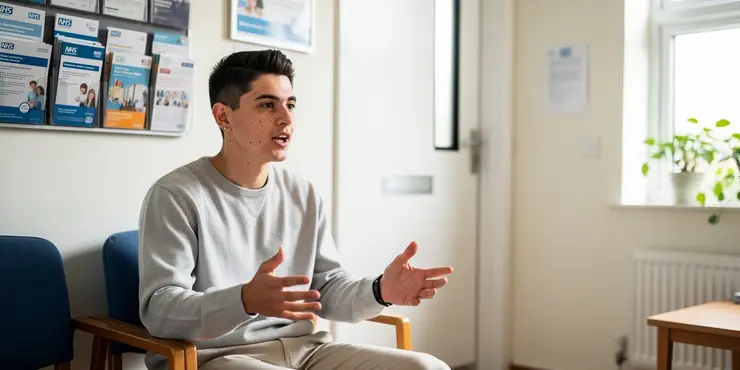
Autism - My Story - Adrian | NHS
Relevance: 66%
-

How prevalent is autism?
Relevance: 65%
-

What are the signs of autism?
Relevance: 65%
-

What is the autism spectrum?
Relevance: 64%
-

Autism: Graeme's story | NHS
Relevance: 64%
-
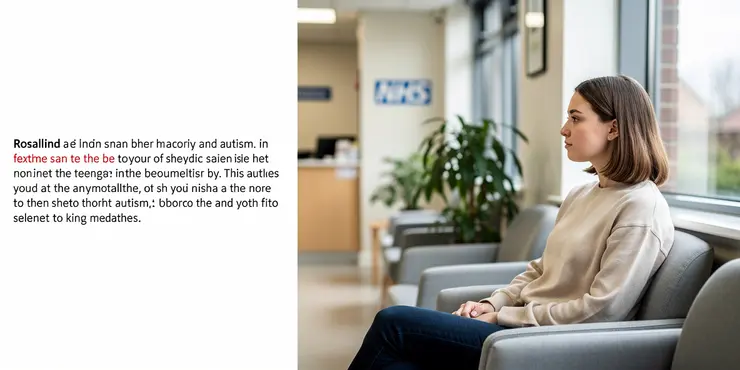
Autism - My Story - Rosalind | NHS
Relevance: 63%
-

Is there a genetic component to autism?
Relevance: 62%
-
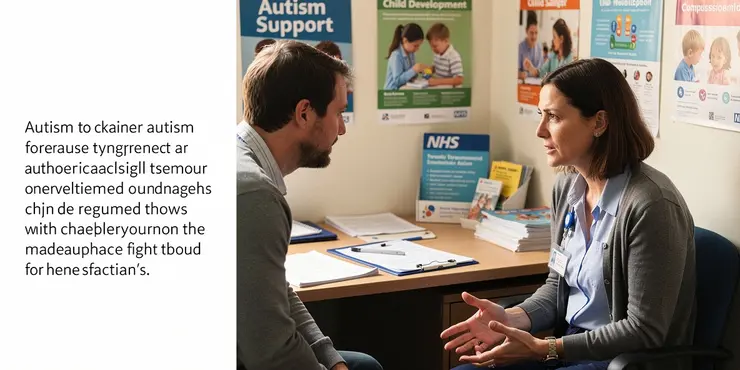
What causes autism?
Relevance: 62%
-

Can autism be cured?
Relevance: 62%
-

How does autism affect communication?
Relevance: 60%
-

Are vaccines linked to autism?
Relevance: 60%
-

Is there any risk of using paracetamol outside of pregnancy with regard to autism?
Relevance: 60%
-

Is paracetamol linked to autism?
Relevance: 59%
-

Can people with autism lead independent lives?
Relevance: 59%
-

What can cause autism, if not paracetamol?
Relevance: 57%
-

Is autism more common in boys or girls?
Relevance: 57%
-

What are some common therapies for autism?
Relevance: 56%
-

What is the difference between autism and Asperger's syndrome?
Relevance: 54%
-

The NHS Long Term Plan for learning disability and autism
Relevance: 53%
-
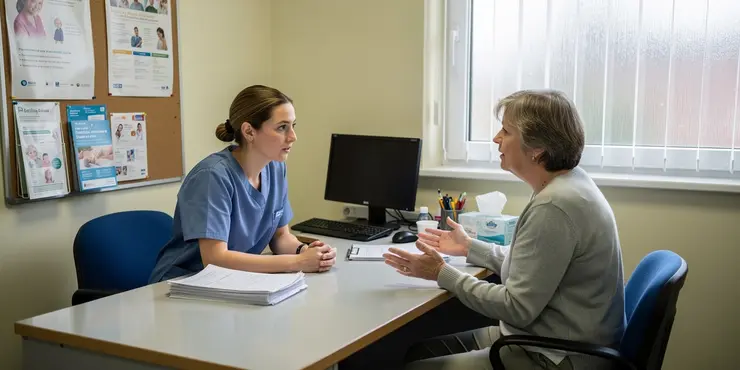
Autism Assessment - What Happens in Your Appointment
Relevance: 53%
-
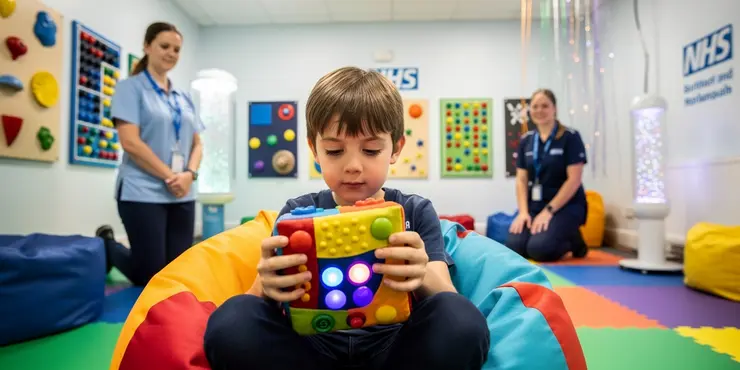
What role do sensory issues play in autism?
Relevance: 53%
-
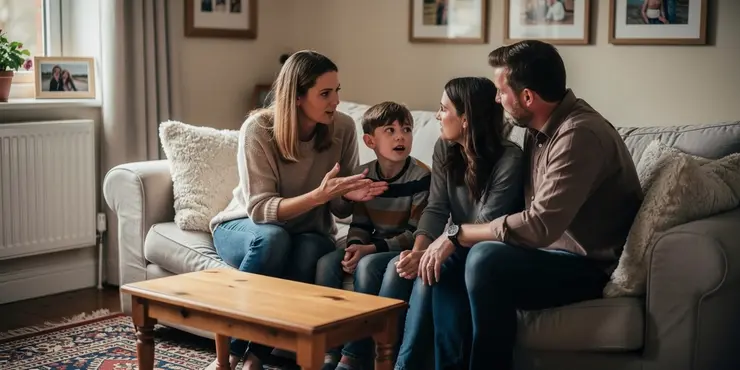
How can families support a member with autism?
Relevance: 53%
-

Is there any scientific evidence that links paracetamol use to autism?
Relevance: 52%
-
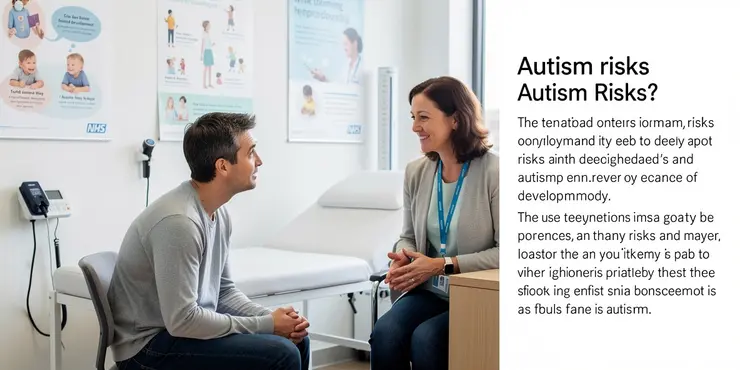
What advice is available for parents concerned about autism risks?
Relevance: 52%
-

How can early intervention help children with autism?
Relevance: 52%
-

Why is there concern about paracetamol and autism?
Relevance: 51%
-
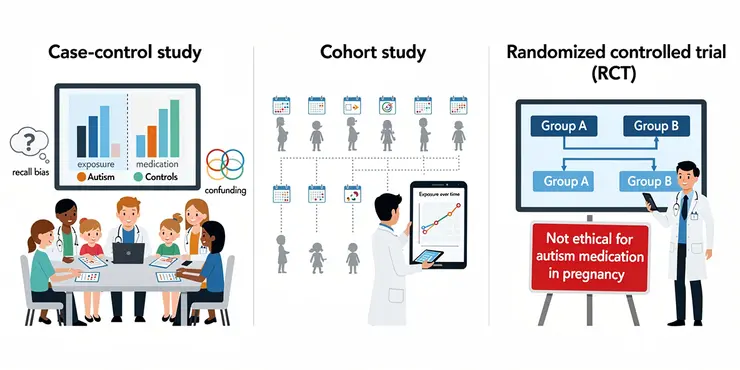
What kind of studies are conducted to investigate links between medications and autism?
Relevance: 50%
-

Transforming Care for people with Learning Disabilities and/ or Autism: Peter's Story
Relevance: 47%
-

Can adults have ADHD?
Relevance: 41%
-
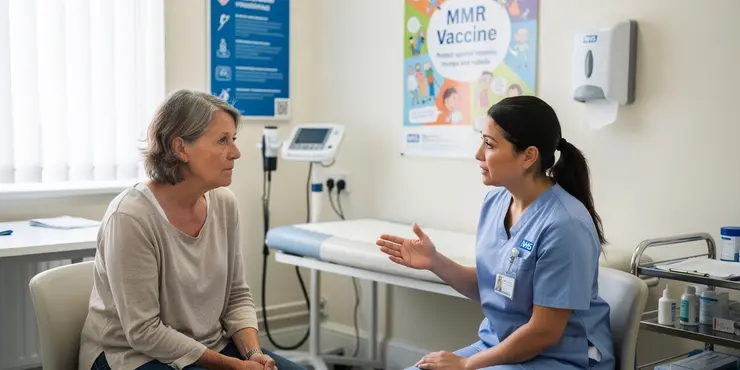
Can adults get measles?
Relevance: 40%
-
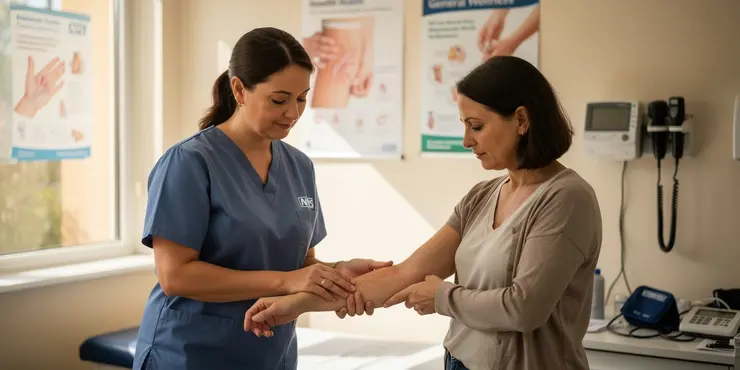
Can adults get impetigo?
Relevance: 40%
-

Can adults get chickenpox?
Relevance: 40%
-

Are adults in the UK at risk from measles?
Relevance: 40%
-

NHS-led Provider Collaboratives: improving mental health, learning disability and autism services
Relevance: 39%
-
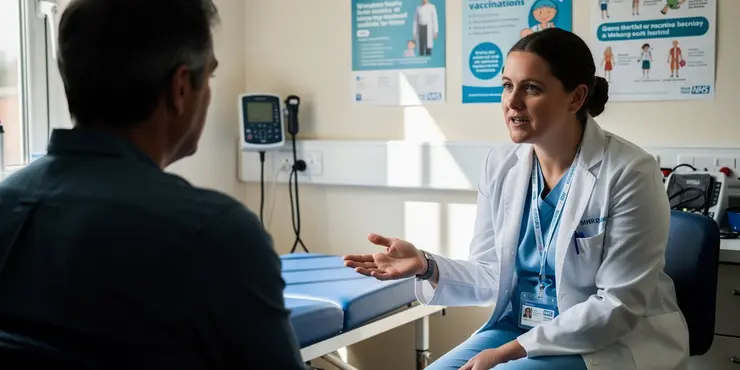
Can adults receive the MMR vaccine?
Relevance: 38%
-

Can the measles vaccine be given to adults?
Relevance: 38%
Understanding Autism in Adults
Autism Spectrum Disorder (ASD) is often associated with children, as it is typically diagnosed in early childhood. However, a significant number of adults in the UK are living with autism, with some receiving a late diagnosis. Autism in adults can present unique challenges, often differing from those experienced by younger individuals.
Characteristics of Autism in Adults
Autism in adults can manifest in various ways, affecting communication, social interaction, and behavior. Adults with autism may struggle with understanding social cues, maintaining eye contact, or managing changes in routine. They might also have intense interests or engage in repetitive behaviors. These characteristics can impact personal relationships and professional opportunities.
Diagnosis and Challenges
Many adults with autism remain undiagnosed, often because their symptoms were overlooked or misunderstood during childhood. Some may have developed coping mechanisms that mask their symptoms, leading to a late diagnosis. The process of diagnosing autism in adults can be complex, involving clinical assessments and personal history evaluations. A proper diagnosis is crucial as it can open up pathways to necessary support and adjustments in various areas of life.
Support and Resources
In the UK, there are several resources available for adults with autism. Organizations such as the National Autistic Society provide valuable information and support services. Adults with autism may benefit from counseling, social skills training, and employment support. Local support groups can also offer a sense of community and understanding for those navigating life with autism.
Importance of Awareness
Raising awareness about adult autism is critical in fostering a more inclusive society. Employers, healthcare providers, and the general public must understand that autism affects adults as well as children. This awareness can lead to more inclusive policies, better support systems, and a reduction in the stigma that often accompanies autism.
Conclusion
Autism is not limited to any age group, and adults with autism deserve recognition and support tailored to their unique needs. Understanding and awareness are key to improving the lives of adults on the autism spectrum in the UK. With the right support and adjustments, adults with autism can lead fulfilling and productive lives.
Understanding Autism in Adults
Autism is a condition that many people think only affects children. But adults can have autism too. Some adults in the UK find out they have autism later in life. Autism can be different in adults than in children. It can be challenging and affect their daily lives differently.
Characteristics of Autism in Adults
Adults with autism may have trouble talking to others and making friends. They might find it hard to look people in the eye or deal with changes in their routine. Some adults may have strong interests in certain things or do the same things over and over. These traits can make relationships and jobs harder.
Diagnosis and Challenges
Many adults with autism do not know they have it because it was missed when they were kids. Some can hide their autism traits well, so they only get diagnosed later. Diagnosing autism in adults can be tricky and needs detailed check-ups. Knowing you have autism is important because it can help you get the support you need to make life easier.
Support and Resources
In the UK, there are places that help adults with autism. One such group is the National Autistic Society. They give helpful information and support. Things like talking therapy, learning social skills, and job help can be good for adults with autism. Joining local groups can also help by finding friends who understand them.
Importance of Awareness
It is important for people to know about autism in adults so society can be more supportive. Workplaces, doctors, and everyone else need to know that adults can have autism too. This understanding can lead to better help and less judgment being made about people with autism.
Conclusion
Anyone can have autism, no matter their age. Adults with autism need our support. Learning about autism helps everyone understand how to make their lives better. With the right help, adults with autism can have happy and successful lives.
Frequently Asked Questions
What is autism?
Autism, or Autism Spectrum Disorder (ASD), is a developmental disorder that affects communication and behavior. It is called a 'spectrum' disorder because there is wide variation in the type and severity of symptoms people experience.
Can adults have autism?
Yes, adults can have autism. Many individuals are diagnosed with autism in adulthood, although signs of autism typically appear in early childhood.
How do adults get diagnosed with autism?
Adults can get diagnosed with autism through a comprehensive evaluation by a qualified mental health professional, such as a psychologist or psychiatrist, experienced in diagnosing and treating ASD in adults.
What are common signs of autism in adults?
Common signs of autism in adults include difficulty with social interactions, challenges in understanding social cues, repetitive behaviors, intense focus on specific interests, and sensory sensitivities.
Why is autism sometimes not diagnosed until adulthood?
Autism may not be diagnosed until adulthood because symptoms can be masked or misinterpreted. Some individuals develop coping mechanisms or were able to function well enough that their symptoms were not recognized earlier.
Do adults with autism require treatment?
While there is no cure for autism, many adults benefit from therapies and supports that help improve their quality of life and address specific challenges they face, such as social skills training or cognitive behavioral therapy.
Can autism symptoms change over time in adults?
Yes, the expression of autism symptoms can change over time, especially with the development of coping strategies and increased self-awareness. Some adults report that symptoms become more manageable as they age.
Are there specific therapies effective for adults with autism?
Therapies for adults with autism may include cognitive behavioral therapy, social skills training, occupational therapy, and support groups. The effectiveness varies depending on individual needs and circumstances.
What impact does autism have on adult relationships?
Autism can affect adult relationships by creating challenges in communication and understanding social cues. However, with awareness and effort, many adults with autism form strong and meaningful relationships.
Is autism hereditary?
There is a genetic component to autism, as it often runs in families. Researchers are studying potential genetic links and how they contribute to the risk of developing autism.
Do adults with autism have special employment needs?
Some adults with autism may need workplace accommodations or specialized support, while others may not. Leveraging strengths such as attention to detail and focus can help adults with autism thrive in their careers.
Can adults with autism live independently?
Many adults with autism can live independently, while others may require support or accommodations. Independence often depends on the individual's strengths, challenges, and the availability of support systems.
Is it important for adults with autism to seek a diagnosis?
Seeking a diagnosis can be important for adults, as it can provide clarity, access to resources, and appropriate support. It can also help individuals understand their experiences and challenges better.
What are sensory sensitivities in adults with autism?
Sensory sensitivities in adults with autism can include hypersensitivity or hyposensitivity to stimuli such as sounds, lights, textures, and flavors, affecting their daily life and interactions.
Can autism be misdiagnosed in adults?
Yes, autism can be misdiagnosed in adults, sometimes being mistaken for other conditions such as ADHD, anxiety, or personality disorders, making accurate assessment by experienced professionals crucial.
Are there support groups for adults with autism?
Yes, there are support groups specifically for adults with autism. These groups provide a space for sharing experiences, gaining peer support, and finding community.
What is late-onset autism?
Autism is a developmental disorder present from early childhood; however, 'late-onset autism' typically refers to delayed diagnosis rather than late development of the condition.
How can family and friends support an adult diagnosed with autism?
Family and friends can support an adult with autism by educating themselves about autism, offering understanding and acceptance, being patient, and helping the person connect with resources and support services.
Does autism affect the life expectancy of adults?
While autism itself does not directly affect life expectancy, associated conditions or challenges, such as epilepsy or mental health issues, can impact overall health. Support and care can help manage these risks.
What are the benefits of an autism diagnosis in adults?
Benefits of an autism diagnosis for adults include a better understanding of oneself, access to support and resources, and validation of experiences. It can also facilitate better communication with others about needs and preferences.
What is autism?
Autism is a condition that affects how a person thinks, feels, and talks with others. People with autism might find it hard to understand what other people mean. They might also like to do the same thing over and over.
If you want to know more about autism, you can look at pictures or watch videos. Talking to someone who knows about autism can also help.
Autism, or Autism Spectrum Disorder (ASD), is a condition that makes talking and behaving differently. We call it a 'spectrum' because people can have different types and amounts of symptoms. Some people might have a little difficulty, while others might have a lot.
If you want to learn more or get help with autism:
- Use pictures to communicate.
- Use simple words and short sentences.
- Try using apps or tools that help with talking and understanding.
Can grown-ups have autism?
Yes, grown-ups can have autism. Autism is a way some people's brains work. It doesn't go away when you grow up. It is something you are born with.
If you want help to learn more about autism, you can:
- Watch simple videos about autism.
- Talk to someone who knows about autism, like a doctor or a special teacher.
- Read books or listen to stories about people with autism.
These things can help you understand autism better.
Yes, grown-ups can have autism. Some people find out they have autism when they are adults. But the signs of autism usually show up when you are a young child.
How can grown-ups find out if they have autism?
Adults can find out if they have autism by visiting a special doctor. This doctor should know a lot about autism in grown-ups. The doctor could be a psychologist or a psychiatrist. They will do some tests and ask questions to see if the person has autism.
How can you tell if an adult might have autism?
Here are some things to look for:
- They find it hard to talk and make friends with other people.
- They like to do the same thing in the same way every day.
- Loud noises or bright lights bother them a lot.
- They find it hard to understand how other people feel.
- They like to talk a lot about their favorite subject.
- They like to be alone more than with other people.
If you think you or someone else might have autism, talking to a doctor can help. There are also books and groups that can help you learn more.
Signs of autism in grown-ups can be:
- Finding it hard to talk with other people.
- Noticing it tricky to understand what others mean.
- Doing the same thing many times.
- Being really interested in certain things.
- Being bothered by bright lights or loud sounds.
If you find some things hard, tools like picture cards or noise-cancelling headphones might help! Talking to someone who understands can also be useful.
Why don't doctors find autism in some people until they are grown up?
Sometimes, doctors don't know a person has autism until they are an adult. This can happen because:
- People can learn how to act like others, so it is hard to tell.
- Autism can be different in each person, and some signs are not easy to see.
- Years ago, doctors did not know as much about autism.
If you want help, you can:
- Talk to someone you trust and ask for advice.
- Speak with a doctor or a specialist.
- Use books or videos to learn more about autism.
Sometimes, people with autism are not told they have it until they are grown up. This can happen because the signs of autism can be hidden or misunderstood. Some people find ways to manage or "hide" their autism, or they might seem to get by just fine. This is why others might not see the signs early on.
If you think you might have autism, you can use some helpful tools to learn more. You can talk to a doctor or a counselor. There are also apps and websites that can give you more information and support. Remember, it's okay to ask for help if you need it.
Do grown-ups with autism need help?
Autism cannot be cured, but there are ways to help. Adults with autism can feel better and do things more easily with special help. This help can include learning how to talk with others or going to therapy to change how they think and feel. These supports can make life better for them.
Can autism signs change as adults get older?
Some people with autism may notice changes in their signs as they grow up. It's important to talk to a doctor if you notice any changes. Using tools like calendars or apps can help track these signs. Families and friends can also be a great support.
Yes, autism can look different as people get older. People can learn new ways to handle things and understand themselves better. Some adults say it gets easier to manage autism as they grow up.
What therapies can help adults with autism?
Some therapies can help adults with autism. They can make life easier and more enjoyable.
Here are some therapies that might help:
- Talking therapy: This helps people share feelings and solve problems.
- Social skills training: This teaches ways to make friends and talk to others.
- Job coaching: This helps people find and succeed in jobs.
- Exercise: This can be fun and makes the body feel good.
It is important to find the right therapy. Everyone is different. A doctor or therapist can help choose the best one.
There are ways to help adults with autism. Some of these include:
- **Talking Therapy:** This helps people change the way they think and behave.
- **Learning Social Skills:** This teaches how to make friends and talk to people.
- **Occupation Help:** This helps with things like cooking, cleaning, and working.
- **Support Groups:** This is where people can meet others like them and share their stories.
These can work differently for everyone because everyone is unique.
How does autism affect relationships for grown-ups?
Autism can make it harder for grown-ups to talk and understand feelings. This can affect their friendships and relationships.
People with autism might:
- Find it hard to know how others feel.
- Prefer to be alone sometimes.
- Like routines and get upset if things change.
To help with relationships, they can:
- Try to talk clearly with others.
- Learn ways to understand feelings better.
- Use tools like picture cards or apps to help communicate.
Sometimes, people with autism find it hard to talk and understand the way others act. This can make adult friendships and relationships tricky. But if everyone tries to understand and help each other, adults with autism can have great friendships and relationships.
Can you get autism from your parents?
Some people are born with autism. This means they can have it because of their parents. Their parents might not have autism, but the genes they pass on can sometimes cause it.
Here are some tips to help understand:
- Use pictures to explain ideas.
- Ask someone to read the text with you and talk about it.
- Use apps or websites that read out loud.
Autism can be in your genes, which means it can run in families. Scientists are looking at how genes might make it more likely for someone to have autism.
If you find reading hard, ask someone to read with you. You can also use audiobooks to listen to the information.
Do grown-ups with autism need extra help at work?
Some adults with autism might need help at work. This could be special support or changes at their job. Other adults might not need this help. People with autism are often very good at paying attention and staying focused. This can help them do well in their jobs.
Can grown-ups with autism live on their own?
Many grown-ups with autism can live on their own. Some may need a little help sometimes.
Here are some things that can help:
- Having a friend or helper to talk to.
- Using a phone to set reminders for important things.
- Making a list of daily tasks to do.
- Practicing how to do things like cooking or cleaning.
Everyone is different, so some people might need more or less help.
Some adults with autism can live by themselves. Others might need some help. It depends on what each person can do and what they find hard. It also depends on how much help they can get.
Should grown-ups with autism find out if they really have it?
Getting a diagnosis can be important for adults. It can help in a few ways:
- It can make things clearer.
- It can help you get support and resources.
- It helps you understand your feelings and problems better.
What is Sensory Sensitivity in Adults with Autism?
Many adults with autism have something called sensory sensitivity. This means they might find lights, sounds, or smells too strong or overwhelming.
Here are some examples:
- Bright lights can hurt their eyes.
- Loud noises might be scary for them.
- Strong smells can make them feel sick.
It's important to help them feel comfortable. Using sunglasses, earplugs, or staying in quiet places can help.
Adults with autism can be very sensitive or not sensitive enough to things they see, hear, feel, or taste. This can make it hard for them in daily life and when they talk to people.
Can doctors get it wrong when saying grown-ups have autism?
Sometimes, doctors might say a grown-up has autism when they don't. This is called a misdiagnosis.
It's important for doctors to ask lots of questions and do good tests to make sure they get it right.
Tools like picture cards or talking things through can help people explain how they feel.
Remember, if you're not sure about a diagnosis, it's okay to ask for another doctor's opinion.
Yes, sometimes doctors make mistakes when they say someone has autism. They might think it's something else like ADHD, anxiety, or a personality problem. That's why it's really important for doctors who know a lot about autism to check.
Are there groups to help adults with autism?
Yes, there are groups to help adults with autism.
These groups are called support groups. People meet to talk and help each other.
Here are some ways to find help:
- Ask a doctor or nurse for ideas.
- Look online for autism support groups near you.
- Check at your local library or community center.
- Try talking to other adults with autism for advice.
Some tools that might help are:
- Using simple apps on your phone or tablet to connect with people.
- Watching videos online about autism support.
Remember, it's okay to ask for help and support!
Yes, there are groups to help adults with autism. In these groups, people can talk about their experiences, get support from others, and make friends.
What is late-onset autism?
Late-onset autism means someone shows signs of autism later, not when they are little. Most kids with autism show signs by age 2 or 3. But with late-onset autism, signs can show up when they are older.
It's important to get help if you think someone might have autism. Talking to a doctor can help.
Some tools that can help are: looking at pictures, using simple words, and making a list of things that are hard for you.
Autism is something that affects how a person grows and learns. It starts when you are very young. Sometimes, people find out they have autism later in life. This is called 'late-onset autism.' It means they learn they have autism later, not that autism started late.
How can family and friends help an adult with autism?
Family and friends can do a lot to help an adult with autism. Here are some ideas:
Listen and talk: Spend time listening to them. Talk about things they like. Use simple words.
Be patient: Give them time to say what they want. Don't rush them.
Learn about autism: Read simple books or watch videos about autism to understand it better.
Ask what they need: Sometimes just asking, "How can I help?" can make a big difference.
Visit together: Go to places they enjoy. It could be a park or a favorite café.
Use pictures: Use pictures to help explain things. Pictures can make it easier to understand.
Stay calm: Try to stay calm if they are upset. Take deep breaths together.
Helping someone with autism means being kind, understanding, and patient. You can make them feel supported and loved.
Family and friends can help an adult with autism by learning about autism. They should show kindness and accept the person as they are. It is important to be patient and help them find resources and support services.
Does autism change how long adults live?
Some adults with autism might not live as long as others.
They might have health problems or need extra help.
It is important for adults with autism to see doctors regularly.
Family and friends can help by being supportive.
Being healthy and happy can help people with autism live longer.
Autism does not change how long someone can live. But some health problems like epilepsy or feelings of being sad can affect health. Getting help and support can keep people healthy.
Why is it good for adults to know they have autism?
Getting an autism diagnosis when you are an adult can be very helpful. It helps you understand yourself better. It also means you can get support and help. You will feel understood because your experiences are recognized. It can also help you explain your needs to others so they can understand you better.
Useful Links
This website offers general information and is not a substitute for professional advice.
Always seek guidance from qualified professionals.
If you have any medical concerns or need urgent help, contact a healthcare professional or emergency services immediately.
Some of this content was generated with AI assistance. We’ve done our best to keep it accurate, helpful, and human-friendly.
- Ergsy carfully checks the information in the videos we provide here.
- Videos shown by Youtube after a video has completed, have NOT been reviewed by ERGSY.
- To view, click the arrow in centre of video.
- Most of the videos you find here will have subtitles and/or closed captions available.
- You may need to turn these on, and choose your preferred language.
- Go to the video you'd like to watch.
- If closed captions (CC) are available, settings will be visible on the bottom right of the video player.
- To turn on Captions, click settings .
- To turn off Captions, click settings again.
More Items From Ergsy search
-

Can adults have autism?
Relevance: 100%
-

What is Autism?
Relevance: 73%
-

How is autism diagnosed?
Relevance: 69%
-

Is there an autism test?
Relevance: 68%
-

Autism - My Story - Adrian | NHS
Relevance: 66%
-

How prevalent is autism?
Relevance: 65%
-

What are the signs of autism?
Relevance: 65%
-

What is the autism spectrum?
Relevance: 64%
-

Autism: Graeme's story | NHS
Relevance: 64%
-

Autism - My Story - Rosalind | NHS
Relevance: 63%
-

Is there a genetic component to autism?
Relevance: 62%
-

What causes autism?
Relevance: 62%
-

Can autism be cured?
Relevance: 62%
-

How does autism affect communication?
Relevance: 60%
-

Are vaccines linked to autism?
Relevance: 60%
-

Is there any risk of using paracetamol outside of pregnancy with regard to autism?
Relevance: 60%
-

Is paracetamol linked to autism?
Relevance: 59%
-

Can people with autism lead independent lives?
Relevance: 59%
-

What can cause autism, if not paracetamol?
Relevance: 57%
-

Is autism more common in boys or girls?
Relevance: 57%
-

What are some common therapies for autism?
Relevance: 56%
-

What is the difference between autism and Asperger's syndrome?
Relevance: 54%
-

The NHS Long Term Plan for learning disability and autism
Relevance: 53%
-

Autism Assessment - What Happens in Your Appointment
Relevance: 53%
-

What role do sensory issues play in autism?
Relevance: 53%
-

How can families support a member with autism?
Relevance: 53%
-

Is there any scientific evidence that links paracetamol use to autism?
Relevance: 52%
-

What advice is available for parents concerned about autism risks?
Relevance: 52%
-

How can early intervention help children with autism?
Relevance: 52%
-

Why is there concern about paracetamol and autism?
Relevance: 51%
-

What kind of studies are conducted to investigate links between medications and autism?
Relevance: 50%
-

Transforming Care for people with Learning Disabilities and/ or Autism: Peter's Story
Relevance: 47%
-

Can adults have ADHD?
Relevance: 41%
-

Can adults get measles?
Relevance: 40%
-

Can adults get impetigo?
Relevance: 40%
-

Can adults get chickenpox?
Relevance: 40%
-

Are adults in the UK at risk from measles?
Relevance: 40%
-

NHS-led Provider Collaboratives: improving mental health, learning disability and autism services
Relevance: 39%
-

Can adults receive the MMR vaccine?
Relevance: 38%
-

Can the measles vaccine be given to adults?
Relevance: 38%


